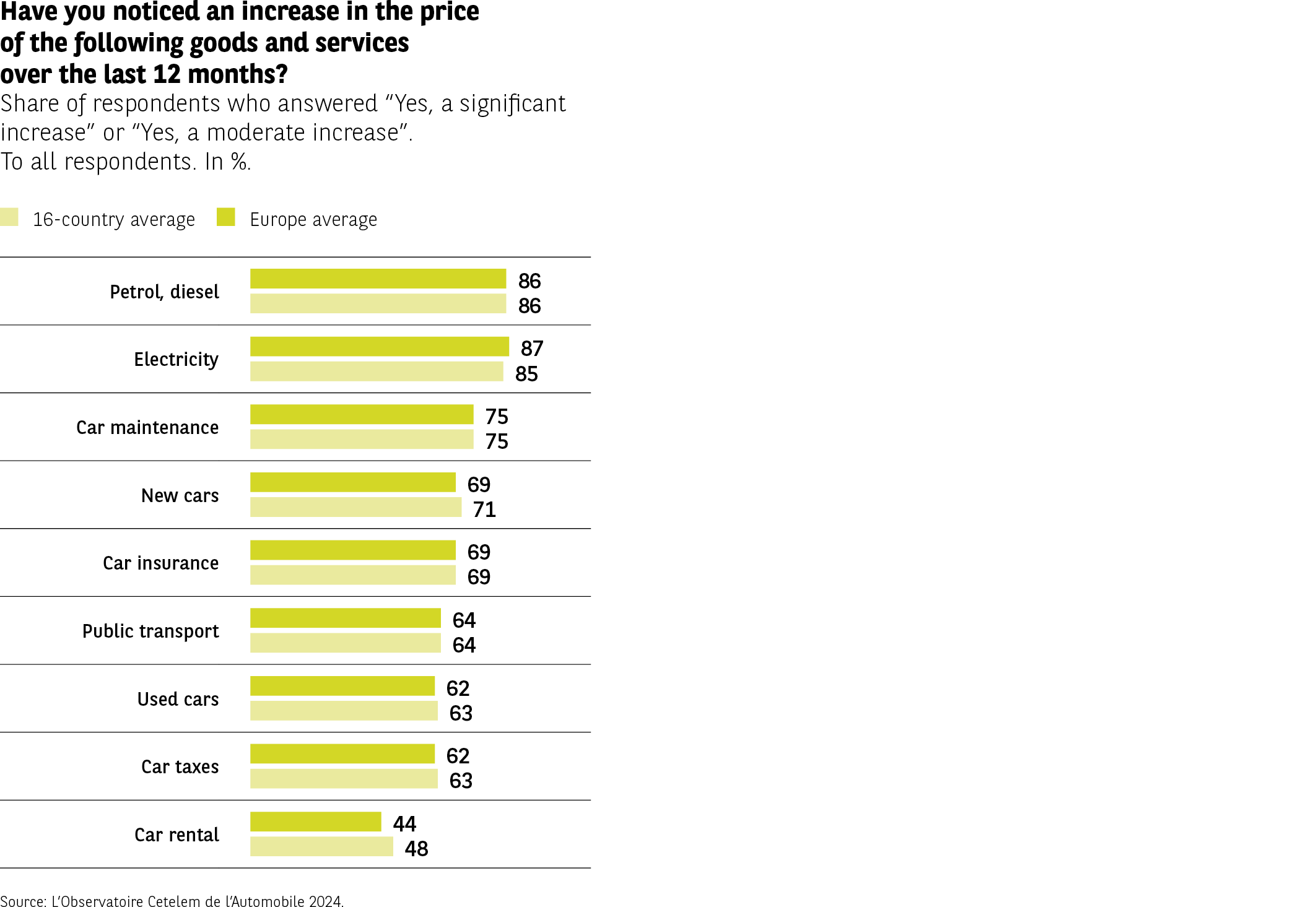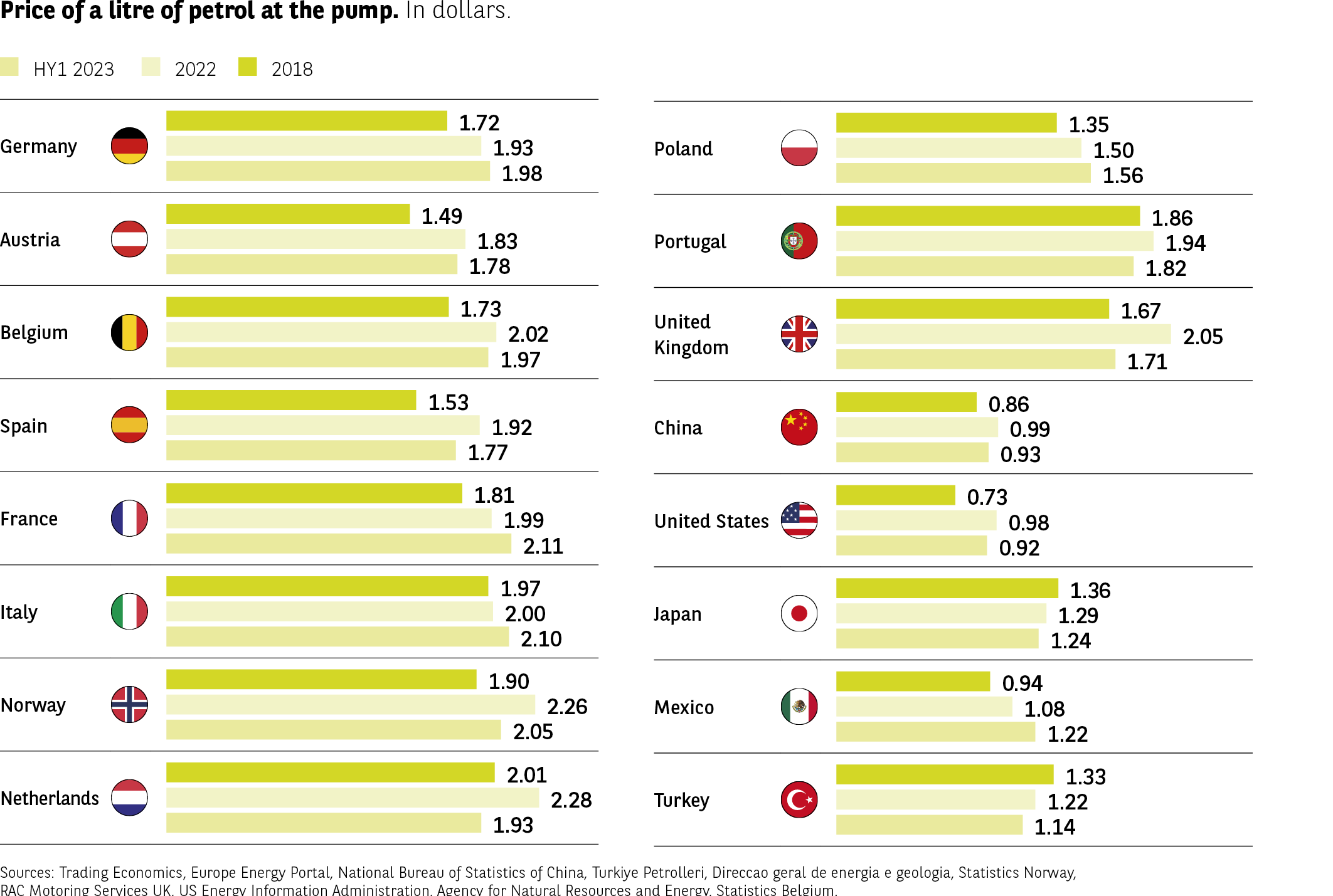Energy costs, but that’s not all


Cost increases across the board
To make matters worse, inflation is still high in most countries, sitting above the acceptable level set by central banks. This has negatively impacted the economic perceptions of motorists, particularly with regard to energy costs. Almost 9 out of 10 motorists point to a rise in the price of petrol, diesel and electricity (Fig. 1). The Turks and Italians are the most vocal on this issue, while the Chinese are more measured.
There is also a sense that running a vehicle is becoming more and more expensive, more so even than buying one. Indeed, after energy, vehicle maintenance is the expense hit hardest by inflation. 3 out of 4 respondents make this point, with the Turks and Mexicans again topping the list, while the Japanese and Norwegians are at the other end of the scale. The rising cost of new cars comes fourth in this ranking, only just ahead of the price of used cars, with 7 out of 10 people underlining this factor.
Fig 1 – Perception of price increases for automotive goods and services
Download this infographic for your presentations Horizontal graph presenting the responses to the question “Have you noticed a price increase for the following goods and services over the past 12 months?”
The green bars correspond to the averages of 16 observed countries.
The evaluated items (and their percentage of people declaring an increase) are:
Gasoline and diesel: 86%
Electricity: 85%
Car maintenance: 75%
New cars: 71%
Car insurance: 69%
Public transportation: 64%
Used cars: 63%
Taxes related to automobiles: 62%
Car rental: 44%
The graph reveals that all items are perceived as increasing, and very strongly for fuels and electricity.
Source: Cetelem Automobile Observatory 2024.
Horizontal graph presenting the responses to the question “Have you noticed a price increase for the following goods and services over the past 12 months?”
The green bars correspond to the averages of 16 observed countries.
The evaluated items (and their percentage of people declaring an increase) are:
Gasoline and diesel: 86%
Electricity: 85%
Car maintenance: 75%
New cars: 71%
Car insurance: 69%
Public transportation: 64%
Used cars: 63%
Taxes related to automobiles: 62%
Car rental: 44%
The graph reveals that all items are perceived as increasing, and very strongly for fuels and electricity.
Source: Cetelem Automobile Observatory 2024.
Energy: a major expense
One of the consequences of the war in Ukraine has been the soaring price of all forms of energy, something that cannot be overlooked. The volatility of fuel itself is matched only by that of its cost, which fluctuates by its very nature, exacerbating the uncertainty felt by motorists. From one country to the next and from one year to the next, it is hard to know what to expect and therefore how to budget for fuel expenses (Fig. 2). What’s more, consumers are more likely to see prices at the pump rise than to see them fall.
The measures put in place to rein in costs, including in France, are often short lived and quickly fall into a state of consumer limbo, before disappearing from the economic landscape. In addition, deliberate production cuts in Saudi Arabia and Russia are pushing prices back up.
Fig 2 – Comparison of fuel prices in dollars (2023 vs 2018)
Download this infographic for your presentations Horizontal graph covering 16 countries, presenting two values for each: price per liter in 2023 and 2018 (in dollars).
Some examples:
Germany: $1.72 (2023) vs $1.49 (2018)
Belgium: $1.93 vs $1.70
Spain: $1.69 vs $1.39
France: $1.85 vs $1.53
Italy: $1.98 vs $1.71
China: $1.05 vs $0.79
United States: $1.03 vs $0.74
Turkey: $1.29 vs $0.92
A generalized increase in fuel prices is observed between 2018 and 2023 in all considered countries.
Horizontal graph covering 16 countries, presenting two values for each: price per liter in 2023 and 2018 (in dollars).
Some examples:
Germany: $1.72 (2023) vs $1.49 (2018)
Belgium: $1.93 vs $1.70
Spain: $1.69 vs $1.39
France: $1.85 vs $1.53
Italy: $1.98 vs $1.71
China: $1.05 vs $0.79
United States: $1.03 vs $0.74
Turkey: $1.29 vs $0.92
A generalized increase in fuel prices is observed between 2018 and 2023 in all considered countries.
